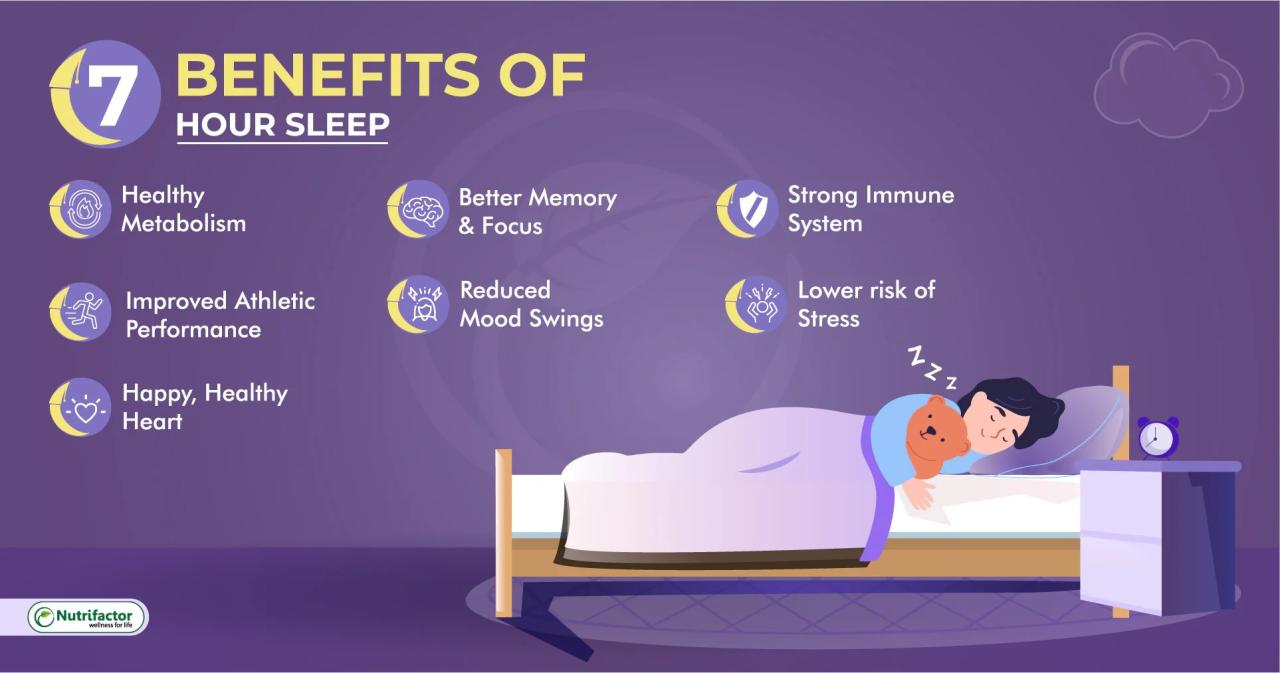The Impact of Sleep Quality on Overall Health sets the stage for this enthralling narrative, offering readers a glimpse into a story that is rich in detail and brimming with originality from the outset. As we delve into the importance of sleep quality, explore the factors influencing it, and uncover the health consequences of poor sleep, this discussion promises to be both informative and thought-provoking.
As we navigate through the strategies to improve sleep quality, readers will gain valuable insights into creating a sleep-friendly environment, establishing bedtime routines, and exploring relaxation techniques. Get ready to embark on a journey that sheds light on the critical link between quality sleep and overall well-being.
Importance of Sleep Quality
Sleep quality plays a vital role in maintaining overall health and well-being. Adequate and restorative sleep is essential for various bodily functions and processes.
Impact of Poor Sleep Quality on Physical Health
Poor sleep quality can have detrimental effects on physical health. It can weaken the immune system, leading to an increased susceptibility to illnesses and infections. Additionally, inadequate sleep has been linked to various chronic conditions such as obesity, heart disease, and diabetes.
Research has shown that insufficient sleep can disrupt hormone regulation, impacting appetite control and metabolism. This disruption can contribute to weight gain and obesity, further increasing the risk of developing related health issues.
Moreover, lack of quality sleep can also affect cardiovascular health, raising the risk of hypertension, stroke, and cardiovascular diseases. It is crucial to prioritize sleep quality to promote optimal physical health and well-being.
Relationship between Sleep Quality and Mental Well-being
The quality of sleep is closely linked to mental health and well-being. Poor sleep quality can negatively impact cognitive function, mood regulation, and emotional stability. Individuals who experience chronic sleep deprivation may be at a higher risk of developing mental health disorders such as anxiety and depression.
Furthermore, insufficient sleep can impair decision-making skills, concentration, and memory retention, affecting overall cognitive performance. It is essential to prioritize quality sleep to support mental clarity, emotional resilience, and overall psychological well-being.
Factors Influencing Sleep Quality

Sleep quality can be influenced by a variety of factors, both internal and external. External factors, in particular, play a significant role in determining the overall quality of our sleep. Lifestyle choices, stress levels, and environmental conditions all contribute to how well we rest at night.
External Factors Affecting Sleep Quality
External factors such as noise, light, temperature, and even the comfort of your mattress and pillows can greatly impact the quality of your sleep. For example, exposure to excessive noise or bright lights can disrupt your sleep cycle, making it harder to fall asleep and stay asleep throughout the night.
Creating a comfortable and quiet sleep environment can help improve the quality of your rest.Stress levels also play a crucial role in determining how well you sleep. High levels of stress and anxiety can lead to difficulty falling asleep, frequent awakenings during the night, and overall poor sleep quality.
Finding ways to manage stress, such as through relaxation techniques or therapy, can help improve your sleep patterns.
Lifestyle Choices and Sleep Quality
Your daily habits and routines can have a significant impact on the quality of your sleep. Factors such as irregular sleep schedules, excessive caffeine or alcohol consumption, and lack of physical activity can all contribute to poor sleep quality. Establishing a consistent bedtime routine, limiting caffeine intake, and staying physically active during the day can help promote better sleep.In conclusion, external factors like noise, light, and stress, as well as lifestyle choices such as sleep habits and daily routines, all play a role in determining the quality of our sleep.
By addressing these factors and making positive changes, we can improve our overall sleep quality and promote better health and well-being.
Health Consequences of Poor Sleep Quality
Inadequate sleep can have severe impacts on both physical and mental health. One of the critical areas affected by poor sleep quality is cognitive function. Sleep is essential for memory consolidation, learning, and overall cognitive performance. When individuals do not get enough quality sleep, they may experience difficulties with concentration, problem-solving, and decision-making.
Effect on Cognitive Function
Poor sleep quality can impair cognitive function in various ways:
- Memory: Lack of sleep can negatively impact both short-term and long-term memory recall.
- Attention: Sleep deprivation can lead to difficulties focusing on tasks and maintaining attention.
- Processing Speed: Reduced sleep quality has been linked to slower cognitive processing speed.
Link to Chronic Health Conditions
Research has shown a strong association between poor sleep quality and the development of chronic health conditions:
- Cardiovascular Disease: Sleep deprivation has been linked to an increased risk of heart disease, hypertension, and stroke.
- Diabetes: Inadequate sleep can contribute to insulin resistance and a higher likelihood of developing type 2 diabetes.
- Obesity: Poor sleep quality disrupts hormones that regulate appetite, leading to weight gain and obesity.
Risks of Prolonged Sleep Deprivation
Extended periods of sleep deprivation can have serious consequences for overall health:
- Immune System Function: Lack of sleep weakens the immune system, making individuals more susceptible to infections and illnesses.
- Mental Health: Chronic sleep deprivation is associated with an increased risk of depression, anxiety, and other mental health disorders.
- Reduced Life Expectancy: Studies have shown that prolonged sleep deprivation can shorten life expectancy and increase mortality rates.
Strategies to Improve Sleep Quality
Creating a sleep-friendly environment, establishing a bedtime routine, and utilizing relaxation techniques are key strategies to enhance sleep quality.
Creating a sleep-friendly environment
One tip for creating a sleep-friendly environment is to ensure your bedroom is cool, quiet, and dark. Consider using earplugs or a white noise machine to block out any disruptive sounds. Additionally, invest in a comfortable mattress and pillows to support quality sleep.
Establishing a bedtime routine
Establishing a consistent bedtime routine signals to your body that it is time to wind down and prepare for sleep. This routine could include activities such as reading a book, taking a warm bath, or practicing relaxation techniques.
Relaxation techniques to enhance sleep quality
Engaging in relaxation techniques before bed can help calm the mind and body, making it easier to fall asleep. Techniques such as deep breathing, progressive muscle relaxation, or meditation can be effective in promoting relaxation and improving sleep quality.
Conclusive Thoughts
![Sleep Statistics By Mental Health and Facts [2024*] Sleep Statistics By Mental Health and Facts [2024*]](https://br.genpi.co/wp-content/uploads/2025/09/VaNVZ-health-issue-impacting-sleep.png)
In conclusion, the Impact of Sleep Quality on Overall Health highlights the intricate interplay between sleep and our physical and mental well-being. By understanding the significance of quality sleep, implementing effective strategies, and prioritizing rest, individuals can take proactive steps towards enhancing their overall health.
Let this discussion serve as a reminder of the profound impact that sleep quality can have on our lives.
Essential Questionnaire
What are some external factors that can affect sleep quality?
External factors such as noise, light, and temperature can significantly impact sleep quality.
How does poor sleep quality affect cognitive function?
Poor sleep quality can impair cognitive function, leading to difficulties in concentration, memory, and decision-making.
What are the risks associated with prolonged sleep deprivation?
Prolonged sleep deprivation can increase the risk of chronic health conditions, weaken the immune system, and negatively impact mental health.

![Sleep Statistics By Mental Health and Facts [2024*]](https://br.genpi.co/wp-content/uploads/2025/09/VaNVZ-health-issue-impacting-sleep-700x375.png)









